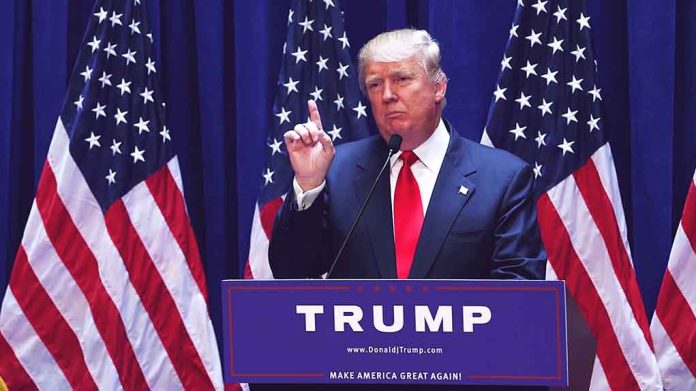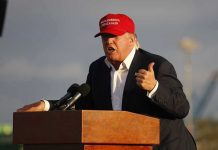
President Trump deployed 2,000 National Guard troops and Marines to quell violent protests after ICE raids at Glenn Valley Foods in Omaha resulted in approximately 70 illegal immigrant arrests, with protesters throwing rocks at federal agents and damaging vehicles.
Key Takeaways
- ICE conducted the largest immigration enforcement operation in Nebraska since Trump took office, detaining approximately 70-80 workers at Glenn Valley Foods in Omaha suspected of being in the country illegally.
- Violent protests erupted following the raid, with demonstrators throwing rocks at federal vehicles and attempting to impede operations, leading to President Trump deploying 2,000 National Guard troops and several hundred Marines.
- Similar protests have spread to at least 15 major cities across the country including Los Angeles, San Francisco, Chicago, and New York, resulting in hundreds of arrests nationwide.
- California Governor Newsom has filed a lawsuit challenging Trump’s deployment of National Guard troops, while the administration has firmly stated that immigration enforcement operations will continue despite the unrest.
- President Trump has warned that additional immigration raids are forthcoming and that any violent protests will be met with significant force.
Major ICE Operation Triggers Nationwide Protests
Federal immigration agents executed a large-scale raid at Glenn Valley Foods in Omaha, Nebraska, detaining 75 to 80 workers suspected of being in the country illegally. The operation, described as the largest immigration enforcement action in Nebraska since President Trump took office, was conducted by ICE and federal law enforcement partners based on what officials described as an ongoing criminal investigation. The company’s owner stated that federal investigators had identified 97 employees using false identification documents, despite the company’s use of the federal e-Verify system intended to prevent such hiring.
“U.S. Immigration and Customs Enforcement, and federal law enforcement partners, executed a federal search warrant at Glenn Valley Foods today, based on an ongoing criminal investigation into the large-scale employment of aliens without authorization to work in the United States,” said Tanya Roman, ICE spokesperson.
Protests Turn Violent as Federal Response Intensifies
In the aftermath of the Omaha raid, protests erupted near the facility with demonstrators confronting federal agents. The situation quickly escalated as protesters began throwing rocks and debris at federal vehicles, shattering at least one window. Some demonstrators jumped on moving ICE vehicles while others shouted profanities at law enforcement officers. The local media reported that protesters directly confronted agents, with some yelling “f— you, pig” as tensions mounted throughout the demonstration. Family members of detained workers arrived at the scene attempting to provide documentation, while community organizers mobilized responses.
“Obviously, we can’t do anything at the worksites. But we can show that this is our community and this is breaking up our families,” said Anna Hernandez, an organizer.
The violence in Omaha mirrored similar scenes playing out across the country, as protests against immigration enforcement operations have spread to at least 15 major cities. In response to the escalating situation, President Trump announced the deployment of 2,000 National Guard members and several hundred Marines to address the violence. This decision prompted immediate legal challenges, with California Governor Newsom filing a lawsuit against the Trump administration over the deployment of federal forces.
Trump Administration Stands Firm on Immigration Enforcement
Despite the widespread protests and civil unrest, the Trump administration has maintained a firm stance on continuing immigration enforcement operations. Homeland Security Secretary Kristi Noem emphasized that the federal government would not be deterred by the demonstrations. The president himself has warned that additional immigration raids are forthcoming and that any resulting riots would be met with significant force, signaling a no-tolerance approach to violent protests.
“ICE will continue to enforce the law,” said Homeland Security Secretary Kristi Noem.
The protests have resulted in hundreds of arrests nationwide and significant property damage in some cities. San Francisco saw over 150 arrests and incidents of vandalism, while Philadelphia reported 15 arrests, with some officers and protesters sustaining minor injuries. In Austin, police used chemical irritants to disperse crowds after officers were injured, and Dallas protests were declared unlawful after objects were thrown at law enforcement. The administration’s tough enforcement posture has drawn criticism from opposition lawmakers but strong support from Trump’s base, who view the crackdown as a necessary measure to restore law and order.
National Guard Mobilization Sparks Constitutional Showdown
The deployment of National Guard troops has created a constitutional standoff between the federal government and state authorities. California’s lawsuit against the Trump administration represents a direct challenge to the president’s authority to deploy military forces domestically. Legal experts are divided on the constitutionality of the move, with supporters citing the need to protect federal property and agents, while critics argue it represents an overreach of executive power. Despite these challenges, National Guard troops have already arrived in Los Angeles and are on standby in other cities.
The wave of protests continues to expand, with activists planning additional demonstrations, including “No Kings” events to coincide with President Trump’s upcoming military parade in Washington. As federal agencies prepare for continued enforcement actions, community organizations are mobilizing to provide legal assistance to detained individuals and their families. The confrontations highlight the deep national divisions over immigration policy and federal enforcement priorities, with no resolution in sight as the administration doubles down on its enforcement strategy.






